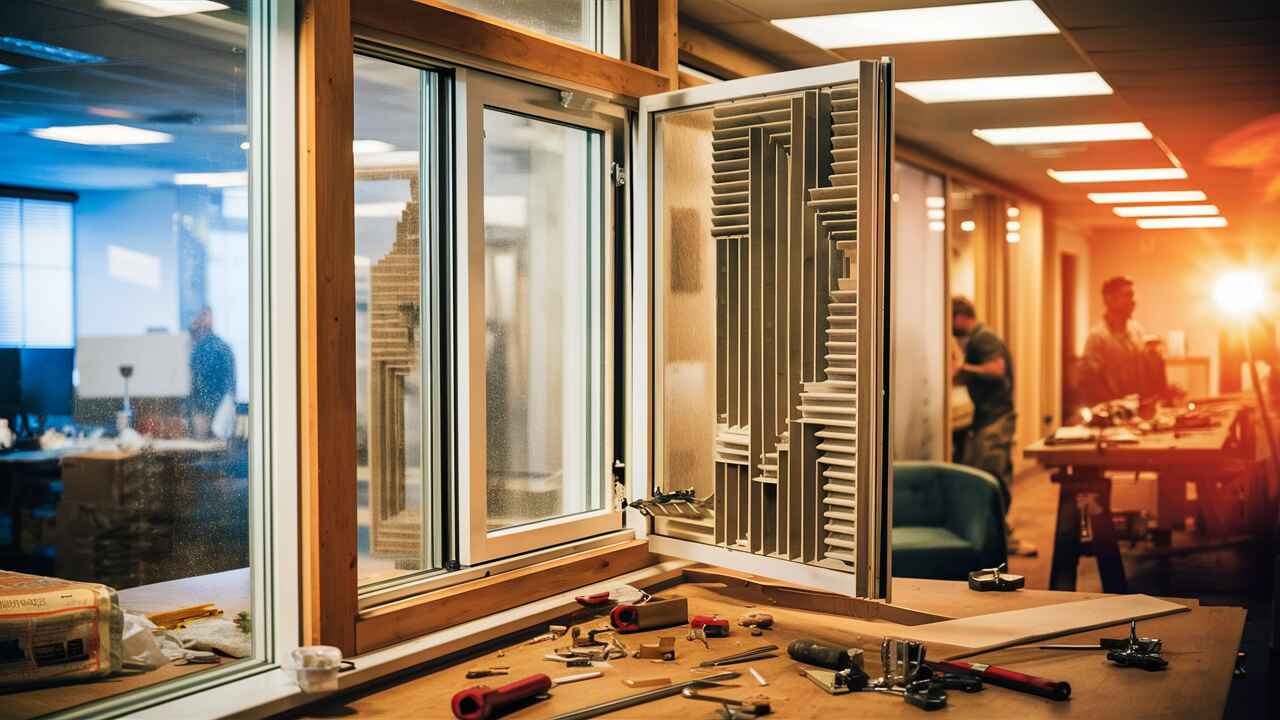In today’s bustling world, finding peace and quiet at home can be a challenge.
Whether you live near a busy street or have noisy neighbors, unwanted noise can be a constant annoyance.
But what if you could soundproof your windows and create a tranquil oasis?
Soundproof windows are available and offer a practical solution to reduce noise in your home.
Why are soundproof windows a must-have for noise reduction at home?
Understanding the basics of noise and soundproofing
Noise is measured in decibels (dB), and louder sounds have higher dB levels.
Everyday sounds like a dog barking (60 dB) or a garbage truck (100 dB) can be disruptive.
Soundproofing aims to block or absorb sound waves, preventing their transfer into your living space.
How soundproof windows work to block outside noise
Standard single-pane windows do little to reduce noise, as sound waves easily vibrate through the glass.
Soundproof windows use specialized glazing and framing to create an effective barrier against noise.
This prevents sound from entering your home, creating a more peaceful environment.
The impact of noise pollution on quality of life
Constant exposure to loud noises can have detrimental effects on your health and well-being.
Unwanted noise can lead to stress, sleep disturbances, and even hearing damage.
By reducing noise levels in your home, you can enjoy a higher quality of life and improved overall comfort.
What makes soundproof windows effective against loud noises?
Ever been jolted awake by an ambulance siren when you’re just trying to catch some Zs in your bedroom? That’s where the magic of soundproof windows comes into play. These new windows are designed to reduce sound so well, it’s like pressing the mute button on the outside world. We’re talking dual pane or even second window setups that create a silent fortress for your pad. These aren’t your run-of-the-mill pane windows; they’re custom built to not just block out noise but also boost thermal and energy efficiency.
Imagine, you’ve got a setup that uses two different kinds of thick glass, sometimes with acoustically savvy foam in the mix, making it the best soundproof solution to make your home a peace haven. Plus, if you’re stuck with single pane relics, upgrading to noise reduction windows can be a game-changer. Not only will they keep your pet from freaking out every time an ambulance zooms by, but you’ll also get to enjoy that occasional silence you’ve been dreaming of. These sound-reducing, residential upgrades can seriously annoyance-proof your crib.
The role of glass thickness and pane in noise reduction
Thicker glass panes are more effective at blocking sound waves than thin panes.
Dual-pane or triple-pane windows have an additional layer of glass and an insulating gap between the panes.
This creates a barrier that prevents sound from transferring through the window.
Laminated vs. double-pane vs. triple-pane: Which is best for you?
Laminated glass consists of two or more panes bonded together with a plastic interlayer.
This construction effectively dampens sound vibrations, reducing noise transmission.
Double-pane and triple-pane windows offer additional noise reduction, but the level of soundproofing depends on the glass thickness and air gap size.
The science behind sound transmission class (STC) ratings
The STC rating measures a window’s ability to reduce airborne sound transmission.
Higher STC ratings indicate better noise-blocking performance, and most soundproof windows have ratings above 40 STC.
When choosing windows, consider the STC rating to ensure adequate noise reduction for your needs.
Can installing soundproof windows really solve your noise problem?

Comparing soundproof window installations: Inserts vs. full replacement
Soundproof window inserts are a cost-effective solution for reducing noise.
These inserts fit behind your existing window and create an additional barrier against sound.
For maximum noise reduction, replacing your existing windows with new soundproof windows may be necessary.
Measuring the effectiveness: Before and after noise levels
The true test of a soundproof window’s effectiveness is how much it lowers noise levels inside your home.
Many homeowners report a significant reduction in intrusive sounds, such as traffic noise or sirens, after installation.
Measuring dB levels before and after can demonstrate the window’s noise-blocking capabilities.
Real homeowner stories: Living near highways and busy urban areas
Homeowners living in noisy environments, like near highways or in densely populated urban areas, often struggle with constant noise pollution.
Installing soundproof windows has transformed their living experience, allowing them to enjoy peace and quiet.
Hear from real people who have soundproofed their homes and discover the life-changing impact it can have.
How to choose the right type of soundproof window for your home
Assessing your home’s unique noise challenges and window needs
Every home faces different noise sources and levels, so a one-size-fits-all approach may not be effective.
Evaluate the types of sounds you want to reduce, their frequency and intensity, and the number of windows that need soundproofing.
This will help you determine the best window solution for your specific situation.
Custom solutions vs. off-the-shelf soundproof window options

For complex noise issues or unique window sizes, custom-built soundproof windows may be the best option.
These are designed and manufactured to your exact specifications, ensuring optimal noise reduction.
Off-the-shelf soundproof windows are also available and can be a more affordable choice for standard window sizes.
Key features to look for: STC rating, glass type, frame and seal quality
When selecting soundproof windows, pay close attention to the STC rating, glass type (laminated, double-pane, or triple-pane), and frame and seal quality.
These factors directly impact the window’s ability to block noise and prevent sound leaks.
Don’t compromise on these essential features to ensure maximum noise reduction in your home.
DIY versus professional soundproof window installation: What you need to know
Step-by-step guide to a DIY soundproof window installation
For handy homeowners, DIY soundproof window installation can be a cost-effective option.
Follow a step-by-step guide to properly measure, prepare, and install the windows for optimal noise reduction.
However, be aware of potential challenges and limitations when attempting a DIY installation.
When to call in the pros: Complex installations and maximizing noise reduction
Professional installation is recommended for complex window configurations, large-scale projects, or when you really need to maximize noise reduction.
Experienced contractors have the expertise and specialized tools to ensure a proper installation, preventing sound leaks and maximizing acoustic performance.
Cost comparison and long-term benefits of professional installation
While professional installation may have a higher upfront cost, it can provide long-term benefits in terms of noise reduction and window longevity.
A properly installed soundproof window will maintain its acoustic performance for years, potentially saving you money on future replacements.
Weigh the costs against the value of a quiet, peaceful living environment.
Living with soundproof windows: Maintenance, care, and enhancing noise reduction
Routine maintenance tips for long-lasting soundproof windows
To ensure your soundproof windows continue to perform at their best, follow these routine maintenance tips:
- Keep frames and seals clean and in good condition to prevent air leaks.
- Inspect for any cracks or damage that could compromise the window’s acoustic integrity.
- Consider reapplying weatherstripping or caulking as needed to maintain a tight seal.
Additional measures to further insulate your home from noise

Even with soundproof windows, some noise may still penetrate your home through other sources.
Enhance noise reduction by adding insulation, soundproofing doors, or using white noise machines in particularly noisy areas.
These additional measures can create a more comprehensive soundproofing solution.
Life after installation: Enjoying a quieter, more peaceful home
Imagine waking up refreshed, free from the sound of honking horns or barking dogs.
With soundproof windows, you can finally enjoy the serenity of a quiet home environment.
Reduce stress, improve concentration, and truly relax in the comfort of your own space.
People Also Ask
How can I make my windows soundproof?
There are several ways to soundproof your windows, including installing:
- Soundproof window inserts
- Double-pane or triple-pane windows with laminated glass
- Custom-built soundproof windows with high STC ratings
How much do soundproof windows cost?
The cost of soundproof windows can vary widely depending on the type, size, and level of noise reduction required. Here are some general cost estimates:
- Soundproof window inserts start around $200-$500 per window for basic models.
- Installing new dual-pane or triple-pane soundproof windows can cost $500-$1,200 per window.
- Custom-built soundproof windows with laminated glass and high STC ratings can range from $1,000-$2,500 per window.
- Professional installation typically adds 20-30% to the overall cost.
While the upfront investment may be higher, soundproof windows can provide significant long-term value by improving your quality of life and potentially increasing your home’s resale value.
What are the best noise reducing windows?
Some of the best noise reducing windows include:
- Triple-pane windows with laminated glass and high STC ratings (60+ STC)
- Dual-pane windows with a wide air gap and laminated glass (45-55 STC)
- Custom-built acoustical windows designed for maximum sound insulation
The most effective option will depend on your specific noise levels and budget. Higher STC ratings generally indicate better noise reduction performance.
Do soundproof windows exist?
Yes, soundproof windows do exist and are designed to significantly reduce outside noise entering your home. While no window can completely block out all sound, specialized soundproof windows use advanced glazing and framing to create an effective acoustic barrier.
Some key attributes of soundproof windows include:
- Thick laminated or double/triple pane glass
- Wide air gaps between panes to dampen vibrations
- Robust frames and seals to prevent sound leaks
- High STC ratings (typically 40+ STC)
With the right soundproof windows installed, you can drastically improve the peace and quiet inside your home environment.


